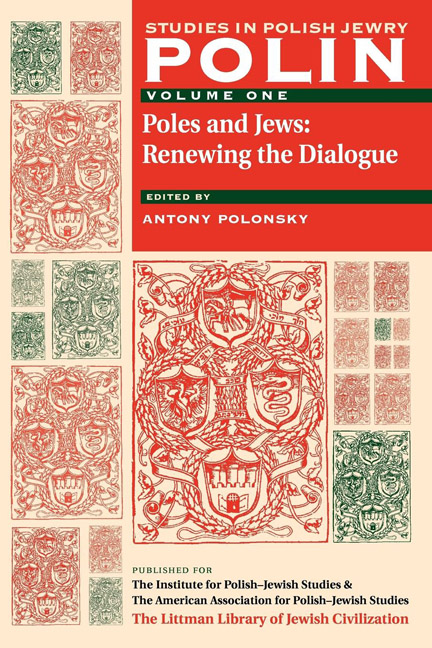Book contents
- Frontmatter
- Dedication
- Editors and Advisers
- Contents
- Polin
- Statement From the Editors
- ARTICLES
- The Reconstruction of Pre-Ashkenazic Jewish Settlements in the Slavic Lands in the Light of Linguistic Sources
- Jewish Perceptions of lnsecurity and Powerlessness in 16th-18th Century Poland
- Some Basic Characteristics of the Jewish Experience in Poland
- The Changes in the Attitude of Polish Society Toward theJews in the 18th Century
- Eros and Enlightenment: Love Against Marriage in the East European Jewish Enlightenment
- Polish-Jewish Relations and the January Uprising: The Polish Perspective
- Loyalty to the Crown or Polish Patriotism? The Metamorphoses of an Anti-Polish Story of the 1863 Insurrection
- The Polish Revolt of 1863 and the Birth of Russification: Bad for the Jews?
- A Turning Point in the History of Polish Socialism and its Attitude Towards the Jewish Question
- The Question of the Assimilation of Jews in the Polish Kingdom (1864-1897): An Interpretive Essay
- The Secular Appropriation of Hasidism by an East European Jewish Intellectual: Dubnow, Renan, and the Besht
- Some Methodological Problems of the Study of Jewish History in Poland Between the Two World Wars
- Jews and Poles in Yiddish Literature in Poland Between the Two World Wars
- Is There a Jewish School of Polish Literature?
- The Underground Movement in Auschwitz Concentration Camp
- DOCUMENTS
- INTERVIEW
- A DIALOGUE
- BIBLIOGRAPHICAL ESSAYS
- BOOK REVIEWS
- CONTRIBUTORS
Jewish Perceptions of lnsecurity and Powerlessness in 16th-18th Century Poland
from ARTICLES
- Frontmatter
- Dedication
- Editors and Advisers
- Contents
- Polin
- Statement From the Editors
- ARTICLES
- The Reconstruction of Pre-Ashkenazic Jewish Settlements in the Slavic Lands in the Light of Linguistic Sources
- Jewish Perceptions of lnsecurity and Powerlessness in 16th-18th Century Poland
- Some Basic Characteristics of the Jewish Experience in Poland
- The Changes in the Attitude of Polish Society Toward theJews in the 18th Century
- Eros and Enlightenment: Love Against Marriage in the East European Jewish Enlightenment
- Polish-Jewish Relations and the January Uprising: The Polish Perspective
- Loyalty to the Crown or Polish Patriotism? The Metamorphoses of an Anti-Polish Story of the 1863 Insurrection
- The Polish Revolt of 1863 and the Birth of Russification: Bad for the Jews?
- A Turning Point in the History of Polish Socialism and its Attitude Towards the Jewish Question
- The Question of the Assimilation of Jews in the Polish Kingdom (1864-1897): An Interpretive Essay
- The Secular Appropriation of Hasidism by an East European Jewish Intellectual: Dubnow, Renan, and the Besht
- Some Methodological Problems of the Study of Jewish History in Poland Between the Two World Wars
- Jews and Poles in Yiddish Literature in Poland Between the Two World Wars
- Is There a Jewish School of Polish Literature?
- The Underground Movement in Auschwitz Concentration Camp
- DOCUMENTS
- INTERVIEW
- A DIALOGUE
- BIBLIOGRAPHICAL ESSAYS
- BOOK REVIEWS
- CONTRIBUTORS
Summary
In assessing the likelihood that the Polish kings would drive the Jews out of Poland-Lithuania in the 17th century, Israel Halpern concluded that, despite factors favouring expulsion, the Jews were safe. Their wealth, economic role and political influence secured their position. This theme has been taken up over the last fifteen years or so by historians living in the United States. These writers, intimately familiar with the strength and achievements of a Jewish community in a pluralist society, have tended to emphasize the fundamental security and the real economic and political power which the Jews possessed in 16th-18th century Poland.
B. D. Weinryb insisted that the word ‘precarious’ could not be applied to Jewish political status in Poland and that the Jews’ ability to work to secure their own interests was at least as great as that of any other group. S. W. Baron emphasized how the Jews held their own politically and were able to manipulate Polish social forces so as to maintain their own upward mobility. G. D. Hundert entitled his dissertation ‘Security and Dependence’ and pointed out how the Jews parlayed their economic links with the various elements of 17th-century Polish society into occupational, legal and physical security. In my own work I have tried to demonstrate that the marriage of convenience between the Jews and the Polish nobility was a marriage nonetheless, securing the rights of the Jews as residents of privately-owned towns and granting them the power to pursue their ·economic and political interests.
These authors find detailed proof for their assertions mainly in Polish sources of a non-legislative nature. It is, however, not difficult to find Jewish sources which, in a general way, confirm the conclusion that Jews in 16th-18th century Poland were relatively safe and to a great extent masters of their own fate.
In the 16th century the great light of rabbinic scholarship, Rabbi Moses Isserles, was impressed by the status of Jews in Poland. In a much-quoted letter to a student who decided to forego a lucrative rabbinic career in Germany and return to Poland, Isserles remarked: ‘It is perhaps preferable to partake of dry bread crust, but in security, in this country.'
- Type
- Chapter
- Information
- Poles and Jews: Renewing the Dialogue , pp. 19 - 27Publisher: Liverpool University PressPrint publication year: 2004

